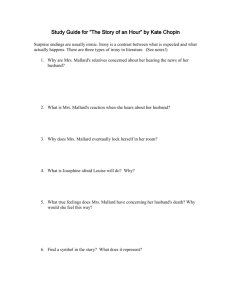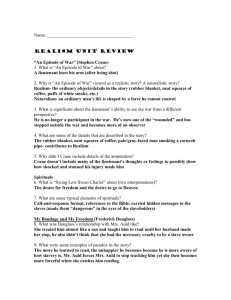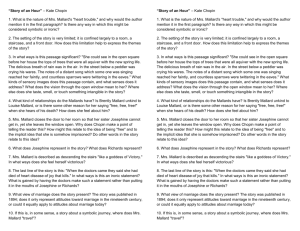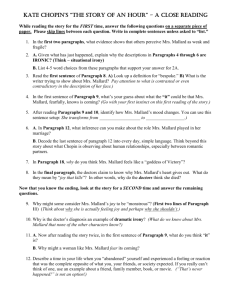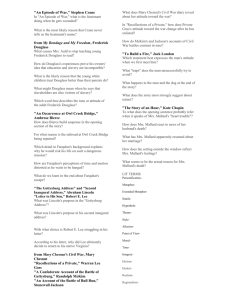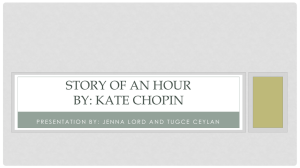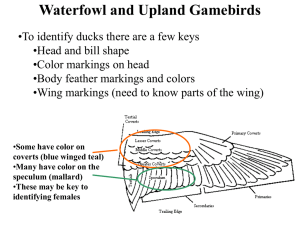Test Essay Question (note: must answer the question as well as
advertisement
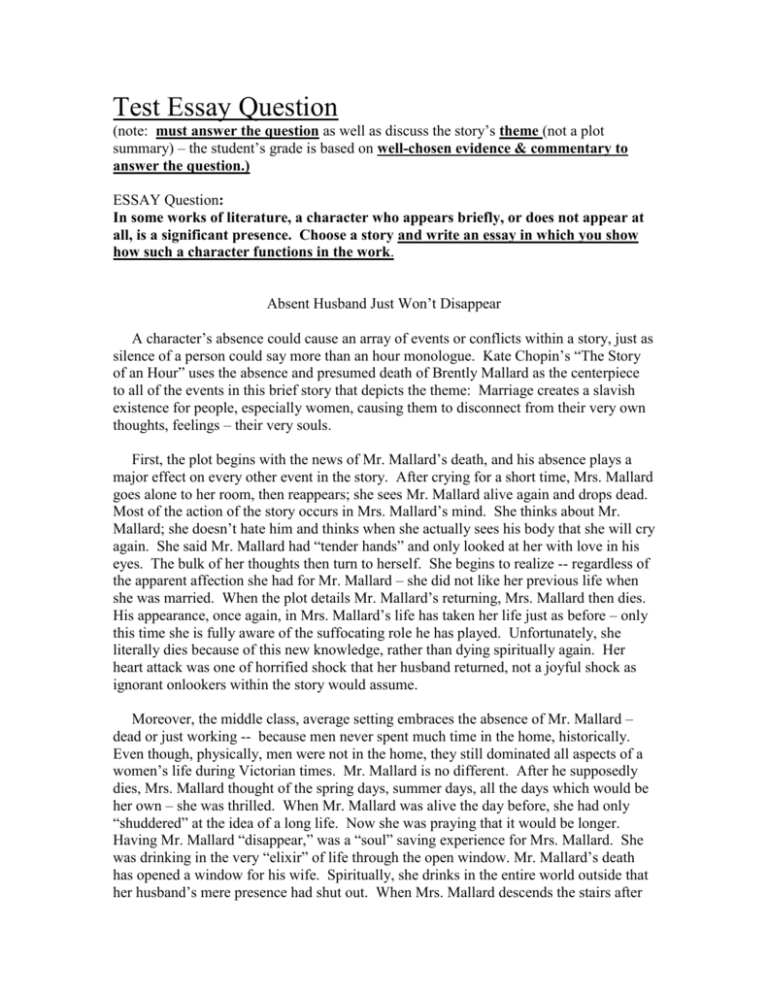
Test Essay Question (note: must answer the question as well as discuss the story’s theme (not a plot summary) – the student’s grade is based on well-chosen evidence & commentary to answer the question.) ESSAY Question: In some works of literature, a character who appears briefly, or does not appear at all, is a significant presence. Choose a story and write an essay in which you show how such a character functions in the work. Absent Husband Just Won’t Disappear A character’s absence could cause an array of events or conflicts within a story, just as silence of a person could say more than an hour monologue. Kate Chopin’s “The Story of an Hour” uses the absence and presumed death of Brently Mallard as the centerpiece to all of the events in this brief story that depicts the theme: Marriage creates a slavish existence for people, especially women, causing them to disconnect from their very own thoughts, feelings – their very souls. First, the plot begins with the news of Mr. Mallard’s death, and his absence plays a major effect on every other event in the story. After crying for a short time, Mrs. Mallard goes alone to her room, then reappears; she sees Mr. Mallard alive again and drops dead. Most of the action of the story occurs in Mrs. Mallard’s mind. She thinks about Mr. Mallard; she doesn’t hate him and thinks when she actually sees his body that she will cry again. She said Mr. Mallard had “tender hands” and only looked at her with love in his eyes. The bulk of her thoughts then turn to herself. She begins to realize -- regardless of the apparent affection she had for Mr. Mallard – she did not like her previous life when she was married. When the plot details Mr. Mallard’s returning, Mrs. Mallard then dies. His appearance, once again, in Mrs. Mallard’s life has taken her life just as before – only this time she is fully aware of the suffocating role he has played. Unfortunately, she literally dies because of this new knowledge, rather than dying spiritually again. Her heart attack was one of horrified shock that her husband returned, not a joyful shock as ignorant onlookers within the story would assume. Moreover, the middle class, average setting embraces the absence of Mr. Mallard – dead or just working -- because men never spent much time in the home, historically. Even though, physically, men were not in the home, they still dominated all aspects of a women’s life during Victorian times. Mr. Mallard is no different. After he supposedly dies, Mrs. Mallard thought of the spring days, summer days, all the days which would be her own – she was thrilled. When Mr. Mallard was alive the day before, she had only “shuddered” at the idea of a long life. Now she was praying that it would be longer. Having Mr. Mallard “disappear,” was a “soul” saving experience for Mrs. Mallard. She was drinking in the very “elixir” of life through the open window. Mr. Mallard’s death has opened a window for his wife. Spiritually, she drinks in the entire world outside that her husband’s mere presence had shut out. When Mrs. Mallard descends the stairs after her life changing moment, someone is opening the front door with a latchkey. As the housewife, Mrs. Mallard could be seen as “locked” into the house until her husband came home, and then according to the historical context of this story: the husband’s needs, the husband’s wants, the husband’s thoughts dominated home life. Obviously, as the reader, we realize how harmful this world is to the wife: a denied existence. Lastly, upon Mr. Mallard’s death and removal from his wife’s world, Mrs. Mallard’s character comes to life. She stares out the window and fears the unnamable “thing” that is coming to her. “It” was creeping out of the sky toward her; she had “suspended” her intelligent thought. She couldn’t even name the feeling she was having because she was so “repressed.” Her body possessed “a physical exhaustion” that haunted her and “reached into her soul.” But upon Mr. Mallard’s death, even though she fought this feeling, it escaped her, “Free, free, free.” After a moment of terror at this societal unacceptable thought that a wife is happy an hour after her good husband’s death, Mrs. Mallard lets the fear go and is just irresistibly happy to not be married anymore. Her “pulse beat faster and her blood warmed up” – her “eyes bright and keen.” She is not happy that Mr. Mallard is dead, but she is happy that she is not married anymore. She would live for herself, and she was in love with that idea. Descending the stairs with her sister after this self-realization, she carried herself “unwittingly like a goddess of Victory.” Mrs. Mallard finds herself after Mr. Mallard’s death. She didn’t know she was even lost, but her body showed signs of it in her spiritual exhaustion and her facial lines of repression. It appears she was so weary fighting her true feelings – hating marriage – all the time being unaware of her fight. Finally, a long and happy life lies ahead of her. She did not have to care for another person – neither physically nor emotionally. Overall, Mr. Mallard’s disappearance from the plot and then reappearance, dominated every aspect of the story just as men dominated the Victorian marriage. Chopin’s theme that marriage is really a crime against one’s self is evident because Mrs. Mallard’s spirit would rather die than return to her slavish existence within her marriage. Her death in the last line of the story shows that she is, indeed, free once and for all. The little wife has dominated not only her husband – finally – but life overall. Her freedom was brief – an hour or so – but what a wonderful hour that was! She lived for herself for one hour. --------------------------------------------------------------------------------------------------------STUDENTS: AN ANALYSIS OF MY ANALYSIS Absent Husband Just Won’t Disappear A character’s absence could cause an array of events or conflicts within a story, just as silence of a person could say more than an hour monologue.(an overall grabber to entice a reader to read – a thoughtful overview point about the essay topic) Kate Chopin’s “The Story of an Hour” uses the absence and presumed death of Brently Mallard as the centerpiece to all of the events in this brief story that depicts the theme: Marriage creates a slavish existence for people, especially women, causing them to disconnect from their very own thoughts and feelings. (I answered the essay question & identified theme here – this is my thesis that I will argue throughout the essay & then talk about the theme in my conclusion) First, the plot begins with the news of Mr. Mallard’s death, and his absence plays a major effect on every other event in the story.(this is my topic sentence where I identify the literary element (I chose “plot”) & proceed to answer the essay question) After crying for a short time, Mrs. Mallard goes alone to her room, then reappears; she sees Mr. Mallard alive again and drops dead. (my evidence from the story) Most of the action of the story occurs in Mrs. Mallard’s mind. She thinks about Mr. Mallard; she doesn’t hate him (my commentary) and thinks when she actually sees his body that she will cry again. She said Mr. Mallard had “tender hands” and only looked at her with love in his eyes (more evidence straight from the story). The bulk of her thoughts then turn to herself. She begins to realize -- regardless of the apparent affection she had for Mr. Mallard – she did not like her previous life when she was married. When the plot details Mr. Mallard’s returning, Mrs. Mallard then dies. His appearance, once again, in Mrs. Mallard’s life has taken her life just as before – only this time she is aware of the suffocating role he has played, and she dies outright because of this new knowledge, rather than dying inward again. Her heart attack was one of horrified shock, not a joyful shock as ignorant onlookers would assume.(all of my commentary – a splash of evidence as well) Moreover, the middle class, average setting embraces the absence of Mr. Mallard – dead or just working -- because men never spent much time in the home, historically speaking (my topic sentence – identifying “setting” as my literary element and connecting to answering the essay question). Even though, physically, men were not in the home, they still dominated all aspects of a women’s life during Victorian times. Mr. Mallard is no different.(my commentary) When Mrs. Mallard thought of the spring days, summer days, all the days which would be her own – she was thrilled. When Mr. Mallard was alive the day before, she had only “shuddered” at the idea of a long life. Now she was praying that it would be longer. Having Mr. Mallard “disappear,” was a “soul” saving experience for Mrs. Mallard. She was drinking in the very “elixir” of life through the open window. (mostly evidence here) Mr. Mallard’s death has opened a window for his wife. Spiritually, she drinks in the entire world outside that her husband’s mere presence had shut out. When Mrs. Mallard descends the stairs after her life changing moment, someone is opening the front door with a latchkey. As the housewife, Mrs. Mallard was literally “locked” into the house until her husband came home, and then according to the historical context of this story: the husband’s needs, the husband’s wants, the husband’s thoughts dominated home life. Obviously, as the reader, we realize how harmful this worldt is to the wife: a denied existence. (my commentary) Lastly, upon Mr. Mallard’s death and removal from his wife’s world, Mrs. Mallard’s character comes to life. (I’m addressing the essay question & identifying my 3rd literary element “characterization”) She stares out the window and fears the unnamable “thing” that is coming to her. “It” was creeping out of the sky toward her; she had “suspended” her intelligent thought. She couldn’t even name the feeling she was having because she was so “repressed.” Her body possessed “a physical exhaustion” that haunted her and “reached into her soul.” But upon Mr. Mallard’s death, even though she fought this feeling, it escaped her, “Free, free, free.” (tons of evidence – my best paragraph) After a moment of terror at this societal unacceptable thought that a wife is happy an hour after her good husband’s death, Mrs. Mallard lets the fear go and is just irresistibly happy to not be married anymore. (my commentary) Her “pulse beat faster and her blood warmed up” – her “eyes bright and keen.” (evidence) She is not happy that Mr. Mallard is dead, but she is happy that she is not married anymore. She would live for herself, and she was in love with that idea.(my commentary) Descending the stairs with her sister after this self-realization, she carried herself “unwittingly like a goddess of Victory.” (evidence) Mrs. Mallard finds herself after Mr. Mallard’s death. She didn’t know she was even lost, but her body showed signs of it in her spiritual exhaustion and her facial lines of repression. It appears she was so weary fighting her true feelings – hating marriage – all the time being unaware of her fight. Finally, a long and happy life lies ahead of her. She did not have to care for another person – neither physically nor emotionally.(my commentary) Overall, Mr. Mallard’s disappearance from the plot and then reappearance, dominated every aspect of the story just as men dominated the Victorian marriage.(answering the question –restating my thesis – and the next line I’m discussing the overall theme of the story) Chopin’s theme that marriage is really a crime against one’s self is evident because Mrs. Mallard’s spirit would rather die than return to her slavish existence within her marriage. Her death in the last line of the story shows that she is, indeed, free once and for all. The little wife has dominated not only her husband – finally – but life overall. Her freedom was brief – an hour or so – but what a wonderful hour that was! She lived for herself for one hour.(my commentary on the overall theme with one line or two restating my answer to the essay question)
